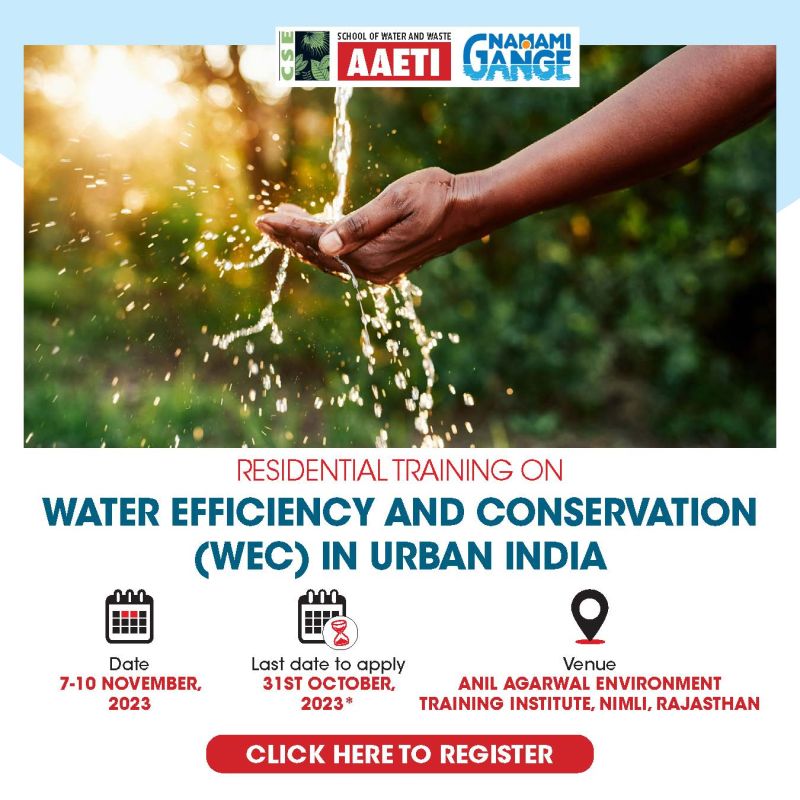Residential Training on Water Efficiency and Conservation (WEC) in Urban India : CSE

![]()
Deadline for the application 31st Oct 23 / Date: 7th – 10th Nov 23 / Venue: Rajasthan
The Centre for Science and Environment (CSE) is a public interest research and advocacy organisation based in New Delhi. CSE researches into, lobbies for and communicates the urgency of development that is both sustainable and equitable. The scenario today demands using knowledge to bring about change. In other words, working India’s democracy. This is what we aim to do.The challenge, we see, is two-pronged. On the one hand, millions live within a biomass based subsistence economy, at the margins of survival. The environment is their only natural asset. But a degraded environment means stress on land, water and forest resources for survival. It means increasing destitution and poverty. Here, opportunity to bring about change is enormous.But it will need a commitment to reform – structural reform- in the way we do business with local communities. On the other hand, rapid industrialization is throwing up new problems: growing toxification and a costly disease burden. The answers will be in reinventing the growth model of the Western world for ourselves, so that we can leapfrog technology choices and find new ways of building wealth that will not cost us the earth. Our aim is to raise these concerns, participate in seeking answers and in pushing for answers, transforming these into policy and so practice. We do this through our research and by communicating our understanding through our publications.
Water efficiency and conservation at the city level are essential for sustainable water management, preserving natural resources, and meeting the increasing water demands of a growing population in India. The urban water cycle is the complex interplay between changing land-use patterns, increasing surface runoff, piped-water supply and sanitation systems. Urban India depends upon primary sources therefore the conservation of locally available sources, i.e. groundwater and waterbodies, is essential for sustainability of available water. In India, however, they are overexploited and neglected.
Water efficiency and conservation (WEC) are strategies to create alternative water resources, conserve resources, and reduce freshwater demand in cities. They involve optimizing water resources, minimizing waste, and promoting sustainable practices like public awareness, infrastructure upgrades, and recycling. These measures ensure a resilient water supply for future generations.
In 2019, CSE also released a policy paper and practitioner’s guide on “WATER EFFICIENCY AND CONSERVATION IN URBAN INDIA” in line with the Sustainable Development Goals (SDGs) for the Ministry of Housing and Urban Affairs.
Taking this agenda forward, CSE in collaboration with National Mission for Clean Ganga (NMCG) is organizing a three days residential training programme on “Water Efficiency and Conservation in Urban India”. This training will help the participants to gain the knowledge about the benefits they can get from engaging with WEC projects implemented after proper planning.
AIM
To educate the participants about the advanced aspects of Water Efficiency and Conservation planning and implementation. This comprehensive training program is designed to equip participants with the knowledge and skills necessary to excel in the field of water resource management.
Objectives
- To sensitize practitioners to the crucial need for Water Efficiency and Conservation (WEC) and to impart a deep understanding of its concepts.
- To provide participants with a structured approach to WEC planning at various scales.
- To equip participants with an in-depth understanding of tools and methodologies used for assessing and measuring WEC.
- To facilitate learning on existing policies, guidelines, and best management practices related to water efficiency and conservation.
Target Audience
- The target audience comprises city officials from urban local bodies (ULBs) and development authorities such as urban planners, town planning officers, engineers, those involved in preparing and enforcing WEC plans at the city/ zonal level and developing and implementing local WEC strategies.
Training Methodology
- The training methodology will follow a mixed approach involving lectures, group exercises, interactive discussions, video documentaries etc.
- Participation/ Completion certificate will be given to the participants upon successful completion of the training.
FOR MORE INFORMATION, KINDLY CONTACT:
TRAINING COORDINATOR
FARAZ AHMAD
Deputy Programme Manager
Water Programme, CSE
Email: faraz.ahmad@cseindia.org
Mobile: +91 88609 33075

